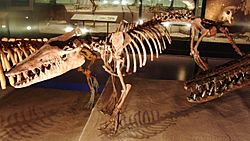Pakicetus facts for kids
Quick facts for kids PakicetusTemporal range: early Eocene, 49–33.9 mya
|
|
|---|---|
 |
|
| Scientific classification | |
| Domain: | |
| Kingdom: | |
| Class: | |
| Order: | |
| Suborder: | |
| Family: |
Pakicetidae
|
| Genus: |
Pakicetus
|
| Binomial name | |
| Pakicetus inachus |
|
Pakicetus was an ancient animal that lived a very long time ago. It was a type of cetacean, which is the group of mammals that includes modern whales, dolphins, and porpoises. However, Pakicetus was quite different from the whales we know today! Its fossils have been found in Pakistan, in rocks that are about 49 to 33.9 million years old. This time period is called the early Eocene epoch.
What Was Pakicetus Like?
When the first fossil of Pakicetus was discovered, it was just a single skull. Scientists first thought it belonged to a different type of ancient mammal. But later, two scientists, Gingerich and Russell, realized it was an early cetacean. They noticed something special about its inner ear bones. These bones had a unique shape, found only in cetaceans. This discovery was very exciting because it suggested that Pakicetus was a transitional species. This means it was a link between ancient land mammals and the whales that live in the ocean today.
In 2001, more complete skeletons of Pakicetus were found. These fossils showed that Pakicetus was mostly a land animal, even though it was related to whales! It was about the size of a wolf and looked quite similar to other ancient mammals called mesonychids. This tells us that early cetaceans spent a lot of time on land before they fully adapted to living in the water.
Where Did Pakicetus Live?
The fossils of Pakicetus were found in an area of Pakistan that was once the coast of an ancient ocean called the Tethys Sea. This means that even though Pakicetus lived mostly on land, it was found near water. This location is important because it helps scientists understand how whales slowly moved from living on land to living entirely in the ocean.
Images for kids
See also
 In Spanish: Pakicetus para niños
In Spanish: Pakicetus para niños
 | Selma Burke |
 | Pauline Powell Burns |
 | Frederick J. Brown |
 | Robert Blackburn |


